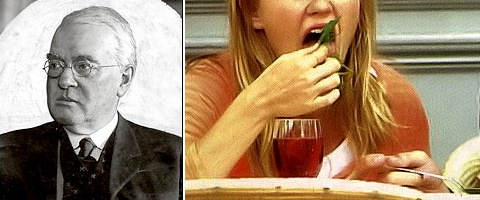The 6 Most Insane Crash Diets of All Time

When we say, "all time," we mean it. The news talks about obesity like it's a recent epidemic, but the truth is that fat people have existed throughout recorded history. Without modern inventions, people in earlier times had to work 10 times harder to get fat, but the extraordinary men and women of those eras persevered and managed, in many cases, to achieve spectacular obesity.
For as long as that has happened, those people have searched for ways to shed the pounds while avoiding "exercise and a sensible diet" at all costs. As you'll see, often it would have been better to just stay fat.
The Alcohol Diet

In 1087, England's William the Conqueror got really fat. Hurt by comments such as King Phillip of France's description of him as "looking pregnant," and despondent over his inability to ride a horse without breaking it in half, he took to his bed and drank nothing but alcohol in an attempt to lose weight.
The Theory:
One can only speculate the reasoning behind it (we know of several guys who tried this diet in college, but for different reasons), but the idea probably went something like this: Food makes you fat. To lose weight, you can stop eating food. But then you'll be hungry. You won't care if you're hungry if you're passed out from too much booze. The booze can't possibly make you fat, because it's a drink, not food. Right?
The Reality:
Wrong. Here is a rough breakdown of calories per gram for the various basic substances we eat:
- Carbohydrates: 4 cal/g
- Proteins: 4 cal/g
- Alcohol: 7 cal/g
- Fat: 9 cal/g
As you can see, William could not have been much worse off sipping lard.
The Results:
On one hand, William was able to get back on his horse again. We know this because he died of complications by falling off of it. You could say he was successful, because he was able to get back on the horse, or unsuccessful because he had trouble staying on it.
Either way, he was allegedly too large to fit into his coffin at burial time and his body was said to have bloated in the afternoon heat and exploded from all the prodding, leaving a reportedly unbearable stench in the church. Any time your body explodes, it's typically the sign of a failed diet.
 Yet, in 1964, Robert Cameron put William's philosophy into print with The Drinking Man's Diet, which emphasized cutting carbohydrates, but whose main attention-getter was its recommendation of alcoholic drinks, which generally contain very few carbs. While he neglected to emphasize that alcohol has almost twice as many calories per gram, and that it may not be the healthiest of substances to incorporate into your regular diet, this was brought up rather vocally by doctors at the time. We have to question Cameron's actual motivation here, just as people questioned ours when we came up with the Porn Diet.
Yet, in 1964, Robert Cameron put William's philosophy into print with The Drinking Man's Diet, which emphasized cutting carbohydrates, but whose main attention-getter was its recommendation of alcoholic drinks, which generally contain very few carbs. While he neglected to emphasize that alcohol has almost twice as many calories per gram, and that it may not be the healthiest of substances to incorporate into your regular diet, this was brought up rather vocally by doctors at the time. We have to question Cameron's actual motivation here, just as people questioned ours when we came up with the Porn Diet.
The fact that "beer belly" is a common term in modern lingo goes to show that we've pretty much got the idea.
Vomiting (Ancient Rome)

The practice of throwing up after a meal is actually older than Hollywood and photographic airbrushing techniques, although Julius Caesar's attached psychological issues may have varied slightly from those of young women today. From accounts such as Cicero's, which explained how Caesar escaped an assassination attempt by vomiting after dinner in his bedroom instead of in the bathroom where his assassins expected him, it seems this sort of practice was common enough in Rome that no one batted an eye. Then again, so was watching a prisoner and a bear fight to the death for fun.
Now, people keep quoting "fun facts" about how ancient Romans threw up so much that they had special rooms to do it in, called "vomitoriums." Not so. While they did vomit a lot, and they did have rooms called vomitoriums, they were actually unrelated. Vomitoriums were just hallways in large stadiums where people exited all at once (so they "vomited" people out onto the streets when the event was over). Although, if they had just come out from watching a bear tear a man's arms off, they might have actually vomited in the vomitorium, but that would just be coincidence.
The Theory:
The idea is straightforward enough--to get rid of the food before you have time to digest it and turn it into fat. In the context of the Romans, they seemed to really enjoy eating and thought of it as a way to make room for more. They were type-A, impatient people who had a continent to conquer and couldn't bother with waiting for it to go out the other end.

The Reality:
By now most people are aware of the health consequences of repeated vomiting. But, just for the record, it causes tooth decay, osteoporosis, heart problems, kidney problems, damage to the esophagus, and fainting from low blood pressure. You know how when you throw up, it sort of feels like you're dying? That's your body trying to tell you something. Despite that, people still do it and we call it bulimia.
The Results:
Caesar was, as you probably know, murdered before any of these symptoms really had a chance to show themselves. As for others engaging in the practice at the time, we're not sure, since complaints about bulimia symptoms probably would have gotten lost in complaints about syphilis, gout, parasites and the other 5 million diseases people picked up by age 30 back then.
These days, we've figured out that the practice can make you die, so on the scale of sensible diet solutions it's about the same as sticking a bear in your kitchen to keep you from getting to the fridge.
The Graham Diet

In the 1820s, a somewhat insane Presbyterian minister named Sylvester Graham came to the conclusion that lustful desires were caused by diet, and that basically, a strict bland diet would stop people from thinking about sex.
The Theory:
Graham's reasoning was basically that eating meat and fat causes a person to become lustful, and sexual desires cause, as we all know, epilepsy, spinal diseases, tuberculosis and other serious diseases. If people couldn't keep their desires under control, they might even end up masturbating, which of course, causes blindness. Also, ketchup and mustard cause insanity. No doubt he had sound scientific backing for all this.
The Reality:
You know who eats a bland, strict diet? Sailors. Guess who also has a reputation for rampant whoring the moment they come ashore. Also? Prisoners. From them, you could make the case that a bland, strict diet causes both shankings and violent man-rape.
The Results:
While a fair amount of people were pretty sure Graham was insane, others bought into his philosophy, which didn't cause much ruckus as long as they were only putting themselves on the diet. However, in 1840, the leadership of Oberlin College was convinced to adopt and enforce Graham's diet on its student body.

Dissatisfaction reached a turning point when one professor was fired for scandalously bringing a pepper shaker to lunch. Things went downhill after "Peppergate," as the press at the time would not have called it, and the grand experiment was canceled.
Graham's legacy was a bland, tasteless whole-grain cracker he invented as a staple of the diet, which became known as the "Graham cracker," a name so clearly evocative of delicious flavor that Nabisco later named its completely different, enriched-flour, honey-flavored cracker after it. Due to the extreme changes from the original recipe, modern-day Graham crackers no longer have the ability to cure lustful thoughts.
Horace Fletcher and "Fletcherizing"

Horace Fletcher's diet philosophy in the early 1900s centered around "Fletcherizing," which is a new word he invented to describe a concept so novel that the English language had no word to describe it, except "chewing," For the immature giggler, it was called "masticating." He was in fact nicknamed, apparently in all seriousness, "The Great Masticator."
The Theory:
Fletcher reasoned that food needed to be chewed about 32 to 80 times before being swallowed in order to properly mix with saliva. By the time you are ready to swallow your food, he suggested, the food should be in liquid form. If the food was already in liquid form, he insisted people chew it anyway, digging their molars into that stringy apple juice or milk.
Fletcher felt it was very important to know exactly what was going into your body, and that one of the best ways of evaluating this was to examine what was coming out of your body. He advocated teaching kids to inspect their own "product" after defecating to be sure they were eating a healthy diet.
The Reality:
Reasonable experts, today, still suggest you take your time to chew your food, as it's a good idea not to send huge chunks down to the stomach. And, eating slower isn't a bad idea if you're looking to lose weight.
However, the problem with Fletcher's diet was that there are some components of food, like fiber, that don't break down into liquid despite all attempts at frenzied mastication. Fletcher's solution was not to eat fiber. This may explain why people were known for being uptight in the Victorian era.
Extensive scientific studies at the time also concluded that examining your own poop is gross.
The Results:
Fletcher lost a lot of weight, and at age 58 allegedly beat a number of college athletes in physical fitness tests in a staged event that he set up. On the other hand, he died of a heart attack.
Fletcher also had a good friend by the name of Dr. John Harvey Kellogg who was on board with his diet and even made up that stupid "Fletcherizing" term. However, the one thing Kellogg did not buy into was the no-fiber rule, so much so that he was inspired to invent a high-fiber breakfast cereal known as "corn flakes."

Fletcher's only other legacy is chewing, which people would no doubt not be doing today if it hadn't been for his amazing discovery.
The Tapeworm Diet

As humans gained knowledge about tapeworms, parasitic worms that attach themselves to the digestive system of a mammalian host and consume its nutriment, most people observed that this was horrible and disgusting. However, demonstrating that female body image problems are by no means unique to our time, some desperate women skimmed past the words "worm," "parasite," "lay eggs inside your digestive system," "severe health danger" and pictures of this:

... and fixated on the phrase "causes severe weight loss."
The Theory:
The idea is that if tapeworms are digesting your food, you're not. You can eat as much as you want and this will go into the worm's tummy, not yours. The tapeworm will get fat and become an outcast in tapeworm society, but that would be its problem, not yours.
The Reality:
What do you think the worm is doing with all that food? It's not a dimensional portal. That worm is using the food to grow bigger and stronger, and maybe lay some eggs. Although most people with a tapeworm in their guts do not show any symptoms, the tapeworm is probably consuming some vitamins and nutrients you need, and has been known to share with its hosts the gifts of diarrhea, nausea and bloating. But that's not all! If the larvae manage to spread to other tissues in your body, such as the nervous system, they can affect your brain, or cause seizures, meningitis or dementia.
Also, if you are having a good time and forget about the worm for a while, don't worry! It will remind you by shedding segments of itself to show up in your poop.
A tapeworm is kind of like an acquaintance you agree to room with because you don't know them that well. They seem nice, and they will be a good workout buddy for you as you try to lose weight, but after a month, they are using your toothbrush, drinking your milk out of the carton, and following you around on dates saying how nice it would be to wear your skin.
One would think that it's not necessary to point out that there are drawbacks to having a disgusting meter-long parasite embedded in your intestines, but apparently some people need it said.

The Results:
After decades of observing ill-health effects and complications, not to mention the difficulties in removing the tapeworm when all is said and done, people now realize the foolishness of this method and--oh, no, wait, they're still doing it.
The Sleeping Beauty Diet

As most of us are aware, Elvis Presley, late in his life, was a whale. To make himself feel better about it, he would eat six eggs, a pound of bacon, a half-pound of sausage and 12 buttermilk biscuits for breakfast. His staple dinner sandwich was a foot-long baguette containing an entire jar of peanut butter and jelly and a pound of bacon. He would eat two of those, then follow it up later with a midnight snack of five hamburgers. Instead of, for example, cutting down to three hamburgers or half a pound of bacon, which would have been unreasonable, he had himself sedated for two weeks.
The Theory:
Logically, it makes sense that if you're too sedated to move, you can't get yourself food, and if you don't eat, you won't gain weight. Coma patients don't get fat, for instance. Elvis was supervised by celebrity doctor Elias Ghanem during this time and fed a special "liquid diet," and as we all know, drinks aren't food, so you won't gain weight.

The Reality:
Unfortunately, Elvis's body may have outsmarted him. Being a pretty efficient machine, the human body will shut down to a minimal level of energy consumption when asleep or extremely inactive. Even being awake and reading quietly will burn a fair amount more energy, as brain activity consumes a decent amount of calories (see below).
Calorie burn rates for various stationary activities:
- 80 - reading (Dostoevsky)
- 70 - reading (Dean Koontz)
- 70 - watching TV
- 60 - baseline, comatose, asleep
- 55 - posting comments on the Internet
Also, common sense should tell you that it doesn't matter whether something is liquid or solid--calories are calories. A hamburger doesn't become a diet hamburger after you put it in a blender.
The Results:
Elvis left the treatment 10 pounds heavier than when he'd started, and it probably wasn't muscle weight. By 1977, he had become so large that aliens were able to spot him from space, and, as we all remember, abducted him. Depending on which tabloid magazine you read, the aliens either used their advanced technology to restore his youth and figure, or to keep him alive for an eternal torment of anal probing.
Either way, the lesson is that your body is an evolutionarily adapted traitor that can't be trusted to lose weight for you while you nap for two weeks. If only liposuction had been around ...
If you liked this article, check out The 10 Most Insane Medical Practices in History .